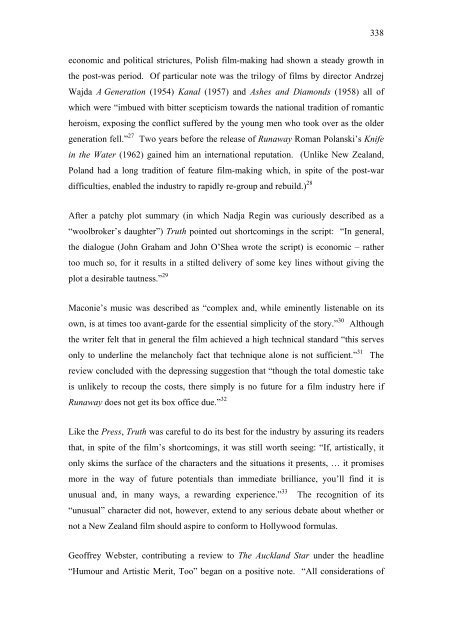Copyright Statement - ResearchSpace@Auckland
Copyright Statement - ResearchSpace@Auckland
Copyright Statement - ResearchSpace@Auckland
Create successful ePaper yourself
Turn your PDF publications into a flip-book with our unique Google optimized e-Paper software.
338<br />
economic and political strictures, Polish film-making had shown a steady growth in<br />
the post-was period. Of particular note was the trilogy of films by director Andrzej<br />
Wajda A Generation (1954) Kanal (1957) and Ashes and Diamonds (1958) all of<br />
which were “imbued with bitter scepticism towards the national tradition of romantic<br />
heroism, exposing the conflict suffered by the young men who took over as the older<br />
generation fell.” 27 Two years before the release of Runaway Roman Polanski’s Knife<br />
in the Water (1962) gained him an international reputation. (Unlike New Zealand,<br />
Poland had a long tradition of feature film-making which, in spite of the post-war<br />
difficulties, enabled the industry to rapidly re-group and rebuild.) 28<br />
After a patchy plot summary (in which Nadja Regin was curiously described as a<br />
“woolbroker’s daughter”) Truth pointed out shortcomings in the script: “In general,<br />
the dialogue (John Graham and John O’Shea wrote the script) is economic – rather<br />
too much so, for it results in a stilted delivery of some key lines without giving the<br />
plot a desirable tautness.” 29<br />
Maconie’s music was described as “complex and, while eminently listenable on its<br />
own, is at times too avant-garde for the essential simplicity of the story.” 30 Although<br />
the writer felt that in general the film achieved a high technical standard “this serves<br />
only to underline the melancholy fact that technique alone is not sufficient.” 31 The<br />
review concluded with the depressing suggestion that “though the total domestic take<br />
is unlikely to recoup the costs, there simply is no future for a film industry here if<br />
Runaway does not get its box office due.” 32<br />
Like the Press, Truth was careful to do its best for the industry by assuring its readers<br />
that, in spite of the film’s shortcomings, it was still worth seeing: “If, artistically, it<br />
only skims the surface of the characters and the situations it presents, … it promises<br />
more in the way of future potentials than immediate brilliance, you’ll find it is<br />
unusual and, in many ways, a rewarding experience.” 33 The recognition of its<br />
“unusual” character did not, however, extend to any serious debate about whether or<br />
not a New Zealand film should aspire to conform to Hollywood formulas.<br />
Geoffrey Webster, contributing a review to The Auckland Star under the headline<br />
“Humour and Artistic Merit, Too” began on a positive note. “All considerations of















